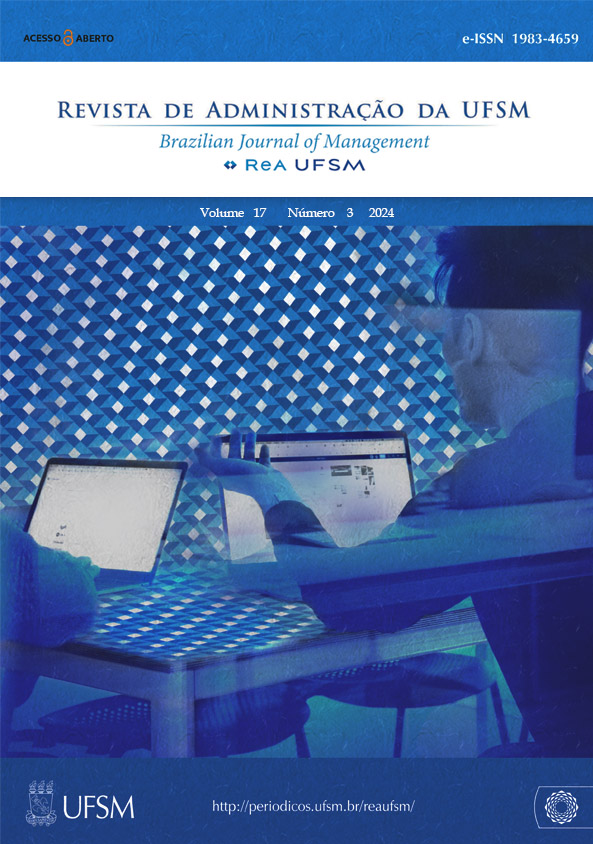It’s possible to measure racism! Analysis of measures and scales of the racism construct
DOI:
https://doi.org/10.5902/1983465987683Keywords:
Racism, Scale construction, Measures, Measurement scales, ConstructAbstract
Purpose: This research aims to analyze the construction and validation of measures and scales of the racism construct through a systematic literature review. The purpose is to examine how these instruments are built based on statistical recommendations for scale development.
Methodology: A systematic literature review followed well-defined inclusion and exclusion criteria. Data were collected from databases available on the Portal de Periódicos Capes, covering a period up to December 2023 (with no start date limitation). After removing duplicate articles and applying the defined filters, six studies were selected for the analysis of scale construction.
Findings: Three specific scales were identified to measure and evaluate the racism construct: the Modern Racism Scale, the Symbolic Racism Scale, and the Ethno-Racial Attitudes Scale. Although there is a predominance of studies on the Modern Racism Scale, other instruments were excluded from the analysis corpus due to non-compliance with inclusion criteria, especially related to article availability.
Originality: Among the 82 analyzed articles, those focused on measures and scales of the racism construct do not provide an analysis of the development of these instruments. This study brings to light an analysis of the construction and validation of these measures and scales.
Downloads
References
Almeida, Silvio Luiz de. (2020). Racismo Estrutural. São Paulo: Sueli Carneiro, Jandaíra, 255. (Plural Feminisms).
Burrell, G., Morgan, G. (1979). Sociological paradigms and organizational analysis: elements of the sociology of corporate life. Portsmouth: Heinemann Educational Books.
Campo-Arias, A., Herazo, E., & Oviedo, H. C. (2016). Valoración psicométrica de la Escala Breve para Racismo Moderno [Psychometric assessment of a brief Modern Racism Scale]. Revista de salud publica (Bogota, Colombia), 18(3), 437–446. https://doi.org/10.15446/rsap.v18n3.41291 DOI: https://doi.org/10.15446/rsap.v18n3.41291
Cárdenas, Manuel. (2007). The Modern Racism Scale: Psychometric Properties and Its Relationship with Psychosocial Variables. Univ. Psychol. , Bogotá , 6(2), 255-262. http://pepsic.bvsalud.org/scielo.p hp?script=sci_arttext&pid=S1657-9 2672007000200005&lng=pt&nrm=iso .
Cunha, M. P. E., Rego, A. (2019). Métodos qualitativos nos estudos organizacionais e de gestão. Revista de Gestão dos Países de Língua Portuguesa, 18(3), 188-206, 30 Dec. DOI: https://doi.org/10.12660/rgplp.v18n3.2019.79780
Devellis, R.F. (2017). Scale Development: theory and applications. 4th. Sage. ed.
Ferenhof, H.A., Fernandes, R. F. (2016). Desmistificando a revisão de literatura como base para redação científica: Método SSF. Revista ACB: Biblioteconomia em Santa Catarina, Florianópolis, 21(3), 550-563, Aug./Nov. ISSN 1414-0594. https://revista.acbsc.org.br/racb/article/view/1194/pdf .
Fernandes, S. C. S., & Pereira, M. E. (2019). Atitudes étnico-raciais: elaboração e evidências de validade de uma medida do racismo à brasileira/Ethnic-racial attitudes: Elaboration and evidence of validity of a measure of Brazilian racism. Psico, 50(4), e28624. https://doi.org/10.15448/1980-8623.2019.4.28624 . DOI: https://doi.org/10.15448/1980-8623.2019.4.28624
Hair Jr., J. F., Babin, B.J., Money, A.H., & Samouel, P. (2005). Fundamentos de métodos de pesquisa em Administração. Porto Alegre: Bookman.
Hair, J., Jr., et al. (2009). Análise multivariada de dados. (6th ed.). Porto Alegre, RS: Bookman
Hair, J.F. et al. (2019). Development and validation of attitudes measurement scales: fundamental and practical aspects. RAUSP Management Journal, 54(4), 490-507. DOI: https://doi.org/10.1108/RAUSP-05-2019-0098
Henry, P. J., Sears, D. O. (2002). The symbolic racism 2000 scale. Political Psychology, 23, 253-283. DOI: https://doi.org/10.1111/0162-895X.00281
McConahay, J. B, et al. (1981). Has racism Declined in America?: It Depends on who is Asking and what is Asked. Journal of conflict Resolution, 25(4), 563–579. https://doi.org/10.1177/002200278102500401 DOI: https://doi.org/10.1177/002200278102500401
McConahay, J. B. (1986). Modern racism, ambivalence, and the modern racism Scal. In: Dovidio, J.F, Gaertner, S.L. Prejudice, discrimination, and racism. Orlando: Academic Press, 91-125.
McNeilly, M. D. et al. (1996). The perceived racism scale: a multidimensional assessment of the experience of white racism among African. Ethnicity & disease, 6(1-2), 154–166; 1996. https://pubmed.ncbi.nlm.nih.gov/8882844/
Ministry of Education / Secretariat for Continuing Education, Literacy and Diversity. (2006). Guidelines and Actions for Ethnic-Racial Relations Education. Brasilia: SECAD.
Navas, Maria Loneliness. (1998). New measurement instruments for the new racism, International Journal of Social Psychology, 13:2, 233-239. https://doi.org/10.1174/021347498760350731 DOI: https://doi.org/10.1174/021347498760350731
Nogueira, Renato. (2015). Afroperspectivity: for a philosophy that decolonizes. https://www.geledes.org.br/afroperspectividade-por-uma-filosofia-que-decoloniza/
Pacheco, L. C. (2015). Cordial racism - manifestation of Brazilian-style racial discrimination - the public and private domain. Journal of Psychology, 2(1), 137-144.
Pettigrew, T. F., Meertens, R.W. (1995). Subtle and blatant prejudice in western Europe. European journal of social psychology , 25, 57-75. https://doi.org/10.1002/ejsp.2420250106 DOI: https://doi.org/10.1002/ejsp.2420250106
Pioli, Barla L.T. et al. (2020). Authentic leadership: analysis of scientific production and measurement scales. Ram, Rev. Adm. Mackenzie, Sao Paulo, 21(3), and RAMG200126. https://doi.org/10.1590/1678-6971/eRAMG200126 . DOI: https://doi.org/10.1590/1678-6971/eramg200126
Rother, E.T. (2007). Systematic review x narrative review. Acta Paulista de Enfermagem, São Paulo, 20(2), v-vi, Jun. DOI: https://doi.org/10.1590/S0103-21002007000200001
Sant’ana, Antônio Olímpio de. (2005). History and basic concepts about racism and its derivatives. In: Munanga, Kabengele (org.). Overcoming racism in Brazil. Brasilia: Ministry of Education, Secretary of Continuing Education, Literacy and Diversity. http://portal.mec.gov.br/secad/arquivos/pdf/racismo_escola.pdf .
Santos, Walberto Silva et al. (2006). Modern racism scale: adaptation to the Brazilian context. Study Psychology [online]. 11(3), 637-645. https://doi.org/10.1590/S1413-73722006000300020 . DOI: https://doi.org/10.1590/S1413-73722006000300020
Sousa Santos, B. (1988). A discourse on the sciences in the transition to a postmodern science. Advanced Studies, 46–71.
Published
How to Cite
Issue
Section
License
Copyright (c) 2024 Karina Francine Marcelino, Mário César Barreto Moraes

This work is licensed under a Creative Commons Attribution 4.0 International License.
Until 2023, copyright was transferred by the authors to ReA/UFSM. As of 2024, the authors of articles published by the journal retain the copyright to their work. ReA/UFSM operates under a Creative Commons Attribution 4.0 International License (CC BY 4.0), which permits unrestricted reuse and distribution of articles, provided the original work is properly cited.






